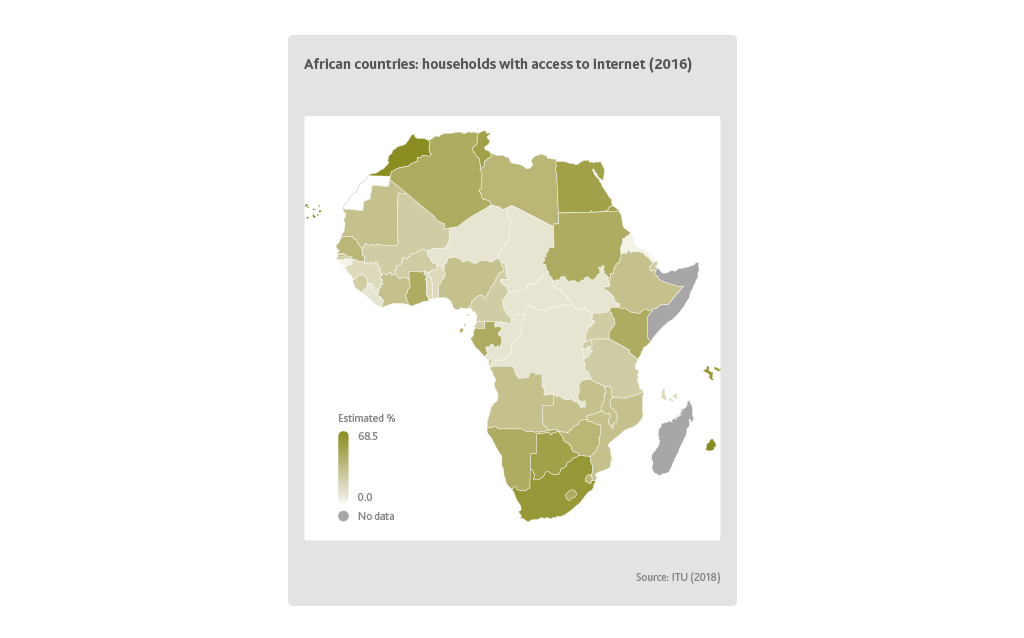Leaving no one behind: the extra mile
29 August, 2019
Strengthening geographical and professional mobility, as well as updating skills and equipping the African workforce for the 4th Industrial Revolution, are key to making the most of and retaining human capital on the continent. However, these changes need to be accompanied by dedicated public policies ensuring that no one is left behind.
This blog focusses on two challenges Africa faces in equipping its labour force with future-ready skills and easing mobility across the continent – the digital divide and social safety nets.
The digital divide
According to the 2019 Ibrahim Forum Report, 66% of African citizens are still offline. The global digital divide, as well as the rural-urban dimension within countries, results in inequalities both in physical access to information and communications technology (ICT) and in the resources and skills needed to harness such technology effectively.
For the 4th Industrial Revolution to effectively foster economic and social progress and boost job opportunities, the new technologies will need to become both accessible and affordable.
The Forum Report further highlights that young Africans are well connected, with around 80% owning their own mobile phone, and 77% using their phone every day. Young Africans use the internet more often than those older than 35 – 71.8% of everyday internet users are under the age of 36.
Of the 52 African countries for which the International Telecommunications Union (ITU) has data on internet access at home in 2016, the five countries with the largest estimated proportion of households with access to internet were Morocco (68.5%), Mauritius (63.3%), South Africa (55.9%), Seychelles (55.2%) and Cabo Verde (48.8%). Meanwhile, the five countries with the smallest estimated proportion of households with access to internet were Liberia (3.0%), DRC (2.8%), Congo (2.7%), Guinea-Bissau (2.2%) and Eritrea (1.9%).

Two key factors are mainly responsible for the global digital divide: the higher cost of capital, and the lower digital readiness in terms of infrastructure, skills and customs and logistics.
The Report also shows that African countries face a slower diffusion of ICT and automation equipment, due to poorer systems infrastructure and lower technological capabilities.
If the cost of capital does not decrease, African countries will not be able to finance investment into newer technologies, keeping levels of digitalisation low and widening the gap with the rest of the world. This will have dramatic consequences in terms of job loss, rising income inequality and concentration of power and wealth in the global North.
Social safety nets
Social protection refers to all public and private initiatives that provide income or consumption transfers to the poor, protect the vulnerable against livelihood risks and enhance the social status and rights of the marginalised with the overall objective of reducing the economic and social vulnerability of poor, vulnerable and marginalised groups.
According the Forum Report, social safety nets are almost nonexistent in Africa and 80% of the labour force do not participate in any traditional social insurance or related protection.
A common societal belief in former generations in Africa was that children were the pension of their parents, leading to many families having several children to increase the chances of being cared for. Traditionally, the family has been at the core of social protection on the continent. The currently increasing mobility of people, be it rural-urban or intra-continental, is changing societal structures, leaving elderly and vulnerable generations without support.
The World Bank’s social protection and labor strategy 2012-2022 emphasises the importance of safety nets to reduce chronic poverty and to limit the impact of shocks on poor and vulnerable households. New models, such as a pension schemes for informal workers in Ghana, are emerging, targeting the needs of an increasing elderly population.
Leaving no one behind requires public policies that address the needs of marginalised groups such as the elderly; close the digital divide; strengthen civil registration and manage demographic growth.


